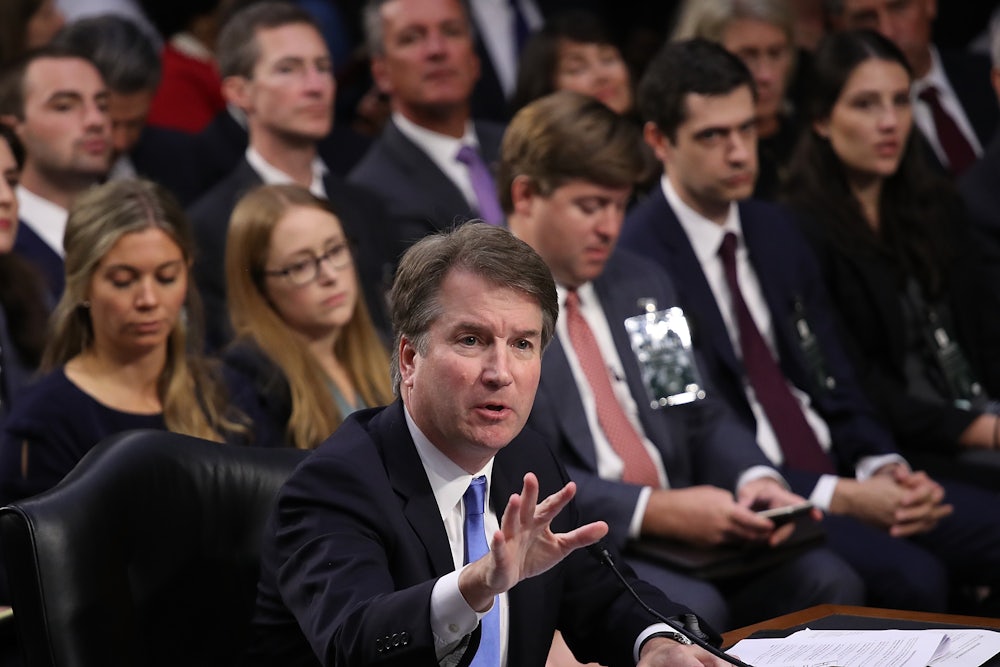Defenders of the beleaguered Supreme Court nomination of Brett Kavanaugh have taken to arguing, in a lawyerly way of exploring a hypothesis, that even if Christine Blasey Ford’s allegations of sexual assault were completely accurate, Kavanaugh would still deserve to be confirmed. “Let’s say he did this exactly as she said,” New York Times Opinion editor Bari Weiss said on the MSNBC show hosted by Stephanie Ruhle. “Should the fact that a 17 year old, presumably very drunk kid, did this, should this be disqualifying? That’s the question at the end of the day, isn’t it?”
Weiss is suggesting the alleged offense might be excusable because of extenuating circumstances: Kavanaugh having been a teenager and drunk. An even more extreme variant of this argument is that what Kavanaugh is accused of was not so terrible as to merit losing a Supreme Court position. Former Time magazine essayist Lance Morrow made that argument in the Wall Street Journal on Monday, writing:
The thing happened—if it happened—an awfully long time ago, back in Ronald Reagan’s time, when the actors in the drama were minors and (the boys, anyway) under the blurring influence of alcohol and adolescent hormones. No clothes were removed, and no sexual penetration occurred. The sin, if there was one, was not one of those that Catholic theology calls peccata clamantia—sins that cry to heaven for vengeance.
The offense alleged is not nothing, by any means. It is ugly, and stupid more than evil, one might think, but trauma is subjective and hard to parse legally.
A major problem with these arguments is that they are viewing the accusations through the prism of criminal law. For the sake of argument, one might allow that a 17-year-old who has been convicted of attempted rape should, later in life, have his record expunged and be reintegrated into society. That isn’t necessarily the case under existing law, but there’s an argument it should be.
But those are not the circumstances of this case. The Senate Judiciary Committee, which is holding the hearings on the accusations, is not a criminal court. It’s not their place to decide whether Kavanaugh was guilty beyond a reasonable doubt and what the appropriate punishment is. Rather, their task is to decide whether Kavanaugh should be allowed to proceed in a nomination process for one of the most powerful jobs in America, a lifetime tenure as a Supreme Court Justice.
In a criminal case, the burden of proof would be necessarily high, in order to make sure that an innocent man is not punished. In a Senate Judiciary Committee hearing, the burden of proof is not about punishment but about evaluating qualifications and also apprising potential harm if a bad person is made a judge. In this process, anything that has bearing on Kavanaugh’s character is pertinent.
If there is credible reason to believe that Kavanaugh did attempt to rape a 15-year-old girl when he was 17-years-old, even if those reasons don’t meet the threshold of legal certainty, then the accusation is highly relevant to whether he should be a Supreme Court Justice. After all, putting someone with a credible accusation against him of a crime in a position of judicial power would undermine the legitimacy of the courts. When Kavanaugh decides on matters relating to gender justice, Americans would have good reason to question his fairness.
Further, if we do view this as a criminal case, it’s not necessarily true that a 17-year-old convicted of attempted rape would receive mercy later in life. In Maryland, where the alleged attempted rape occurred, a 17-year-old facing these charges would be tried as an adult. Of course, once we talk about a trial, then we have to face real-world issues of the fairness of the system. As a white child of well-to-do parents, a 17-year-old Kavanaugh, in a hypothetical trial, likely would not have received the harshest punishment. But it’s not obvious that those calling for forgiveness now are concerned about the real inequities of the criminal justice system, including the over-incarceration of children in the United States. Kavanaugh’s defenders’ current preoccupation with the particularities of youth can easily appear opportunistic.
Finally, saying that Kavanaugh deserves forgiveness and restoration ignores the fact that he’s never been punished and denies any wrong-doing. As writer Ezekiel Kweku tweeted, we’re having a conversation “about forgiveness without confession, redemption without repentance, restoration without restitution.”
If Kavanaugh did admit he wronged Christine Blasey Ford, then we could have a fruitful discussion about putting the past behind us. But as long as he maintains his innocence, the only option is to try and evaluate how credible Ford’s accusation is.
